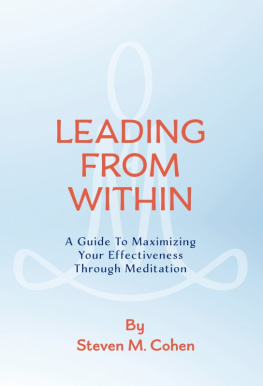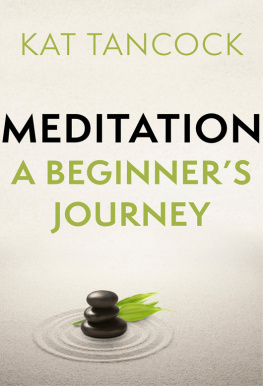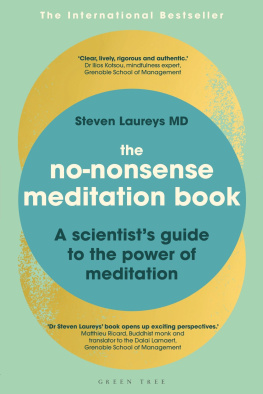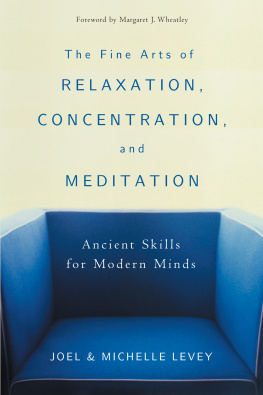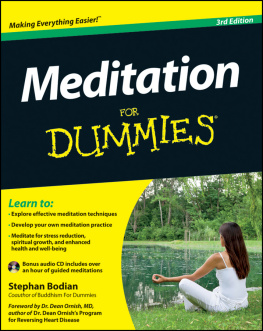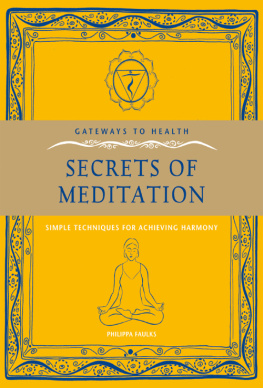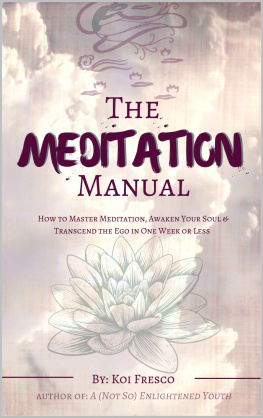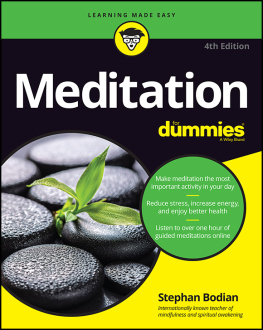Copyright 2019 Steven M. Cohen
All rights reserved. No part of this publication may be reproduced, stored in a retrieval system or transmitted in any form or by any meanselectronic, mechanical, photocopy, recording or any otherexcept for brief quotations in printed reviews or other fair use designed to spread the wisdom of a meditation practice.
Published by Meditation4Leadership 2019
ISBN: 978-0-9996337-0-0
eISBN: 978-1-5439776-5-3
Library of Congress Control Number: 2019904948
Printed in the United States by BookBaby.
Book jacket design by Julie Forlepa.
Illustrations by Dawn Vernon.
Logo designed by Melissa Epstein.
The views expressed in this work are solely those of the author and do not necessarily reflect the views of the publisher or the authors, CEOs and others mentioned in this book. The excerpts of other books included in this work are not book summaries but quotes or commentary to make a specific point about a specific profiled leadership or meditation principle. In some cases, these excerpts are used differently from the authors original context. Permission was requested from all authors whose books were the primary one profiled in each chapter and for use of all third party illustrations.
TABLE OF CONTENTS
I. WHY CONSIDER MEDITATION
We are in the midst of a turning point in human history. The Information Age has shifted the focus of business and society from production to knowledge. As with every meaningful change we face, this one offers both challenges and opportunities. Every decision we make, in life and in business, is impacted by the onslaught of information now available with a simple touch of a finger on a computer or cell phone. Our effectiveness is based in large part on how we process and utilize this wealth of information. How do we sort through that abundance of information so that we can most successfully navigate challenges while leveraging all possible opportunities?
The answer may be internal rather than external. Yes, a wealth of data and advice is available to us from many sources, including books, media, and the Internet. The ability to process information requires an understanding of a critical difference: the difference between factual knowledge and wisdom. Wisdom is described differently across cultures, religions and societies, but no matter how we characterize this type of insight and perspective, there is growing empirical evidence that greater access to this wisdom directly translates to improved workplace performance. How can we access and use this wisdom to lead our lives more successfully and lead others more effectively?
We each have so much potential. So many of the organizations in which we work or volunteer have the potential to make a greater impact than they do. Leadership is the process of maximizing your impact and the impact of others to achieve a mission. We can all be leaders.
The primary culprit holding us back from achieving our optimal performance is usually ourselves. Too often, we miss opportunities right in front of us because we are not sufficiently aware. Too often, our reaction to a person or situation is impacted by our prior personal history. Too often, we view an event, situation, or opportunity through a distorted lens, leading us to an emotion-based reaction that is ineffective or insufficient. Too often, we create physical and emotional stress for ourselves based upon this distorted view. This self-imposed stress inhibits our health, our joy and our effectiveness. Too often, our fears hold us back from taking the actions necessary to achieve our goals. We disconnect rather than stay connected to the situation and the people that can best assist us.
How can you avoid becoming your own worst enemy by being more aware and, in the process, improve your focus, creativity and perspective, reducing stress, addressing your fears, enhancing your relationships, and increasing your interpersonal and intra-personal effectiveness? How can your personal growth facilitate meaningful change in the organizations in which you work and volunteer?
Millions of people around the globe have discovered that the answer to these questions is the same: meditation. At its core, meditation is a practice that assists us in being more present, more aware in each moment of what is going on around us and inside us. This awareness facilitates our ability to make better decisions, take better actions and be happier doing so. Meditation practices are centuries-old and incorporated into every religion and culture, sometimes simply as a moment of silence. More recently, the benefits of meditation have been studied and supported by leading neurologists who have demonstrated that regular meditation practice actually changes brain structure, verifying scientifically-reported cognitive and psychological benefits that go beyond just relaxation. All it takes to realize these benefits is for you to learn which techniques work best for you, and 10 minutes a day of practice.
The insight and perspective that comes from a daily meditation practice can help you become a better leader, in whatever way pertains to your lifeas a leader of a business, a community organization, a work team, a household, or as a leader of your own personal growth. An examination of the top leaders and leadership theories developed over the last five decades highlights the critical importance of contemplative qualities that can be developed or enhanced through practice.
This book presents 13 personal traits that are central to effective leadership. Each chapter explains the importance of a leadership trait; describes how that quality is emphasized in leadership theory and practice by a renowned organizational leader, management professor or author; and offers meditative techniques and guided meditations that will help you access and develop that trait and apply it to the organizations in which you have a leadership role.
The 13 traits are integrated into Four Pillars, Awareness, Connection, Perspective and Potential, each of which is enhanced by meditation practice to provide a foundation for increasing effectiveness. These pillars can ground us as we proceed through our lifelong journey. When we stray or fail or feel lost, we can sense which of these pillars requires reinforcement and set our intention during meditation practice to focus on that pillar. What we practice in our meditation impacts how we live our life.
This book offers you the tools to develop your own meditation practice based upon which types of meditation and preparatory contemplative techniques work best for you at this time. At the same time, this book profiles lessons from recognized leaders and leadership authors to assist you in better recognizing the traits where you are strong and those where there is opportunity for growth using a different technique. Hopefully, your experience will help you appreciate the value that regular meditation practice can have on your health, your relationships, and your effectiveness as you practice and integrate the wisdom you gain from your meditation practice into your life.
What Can a Daily Meditation Practice Do for You?
The various meditation practices profiled in this book were chosen to facilitate your ability to:
become more aware and perceive things closer to how they really are
access your capacity for creativity, insight and wisdom by quieting the everyday chatter inside your head
diffuse stress and experience more moments of calm, balance and joy
connect to your emotions and embrace your feelings, reducing the impact of suppressed feelings in future situations

